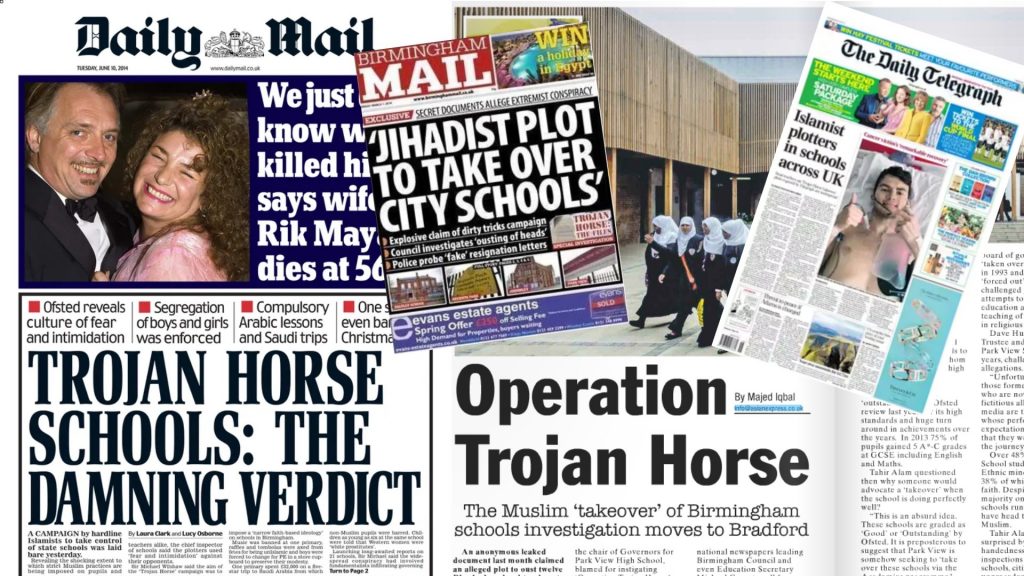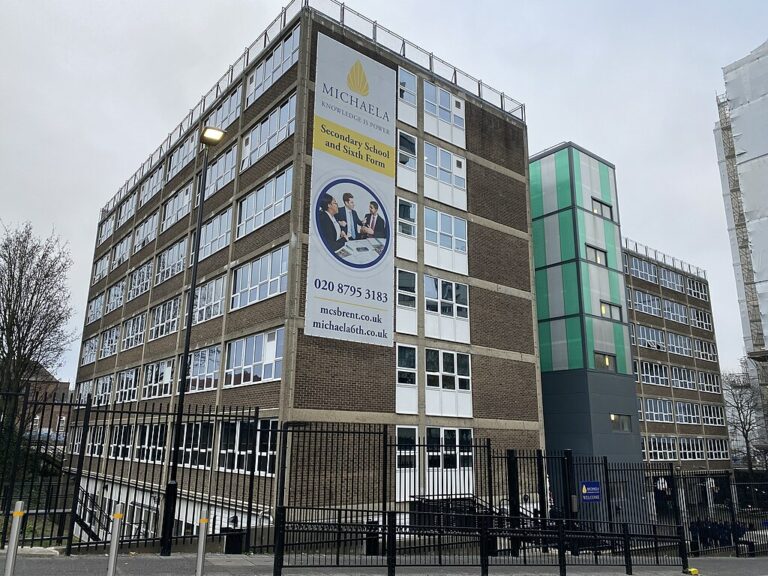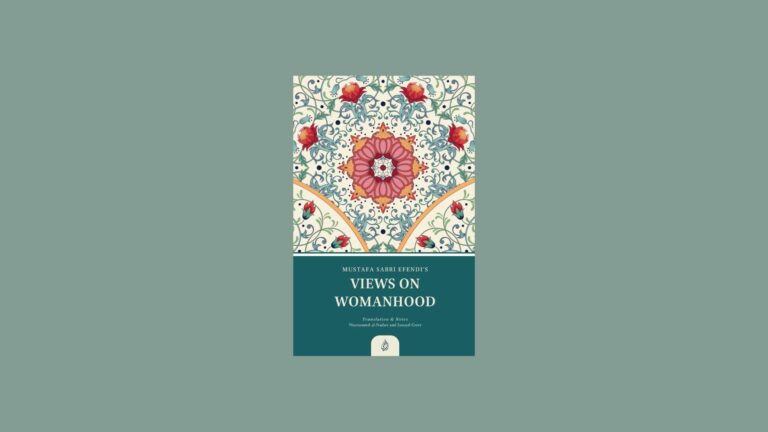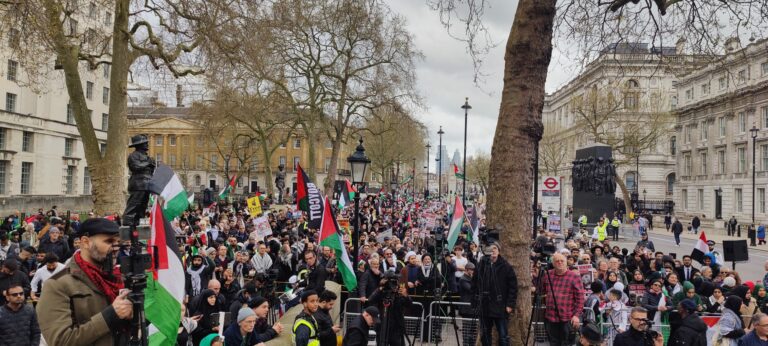Arzu Merali reflects on Serial’s podcast series of the infamous affair that resulted in a societal sea change for the worse against Muslims [substitute alternate teaser here].
Let me start with this. Serial is excellent and everyone needs to listen to it, even if, like me you were already very familiar with the ins and outs of the case (including those aspects not widely known).
This is not a review of the Trojan Horse / Hoax Affair, where a group of mainly Muslim governors and some teaching staff were accused of a concerted plot to take over schools in Birmingham and ‘Islamise’ them (whatever that means). Everyone accepted that there was no plot, but the things that those involved did do were maligned by ministers and media. Laws were enacted, educational and security policies beefed up. Individuals involved were banned from the education sector, careers destroyed, and the schools they had all been involved in turning around from failing to – by the government’s own admission – outstanding left to collapse silently into chaos.
If you want the ins and outs of this case in addition to listening to Serial, read John Holmwood and Therese O’Toole’s book or read / watch any of the resources on this page. For a discussion of how the affair became part of the project of socially engineering a complaint and obliging Muslim community, read Faisal Bodi’s contemporaneous piece here.
This piece is about journalism from an erstwhile journalist. Because listening to Serial was deeply personal for me in terms of the challenges of being a Muslim writer. It was also a commentary on journalism and its role(s) in this affair and more broadly, for better and worse.
Hamza Syed starts the podcast by saying this is his first story, and possibly his last. And I get why almost straight away.
Framer versus Framer
I started listening with some trepidation. The media reportage of Trojan Horse has been not simply poor but part of the problem. With the exception of Richard Adams in The Guardian, and Samira Shackle’s excellent long piece many years down the road, the media narrative mirrored to greater and lesser, but mainly greater extent, the government’s: that something nefarious was afoot. And that of course gave succour to political actors.
Seeing the words New York Times associated with the podcast to me, didn’t augur well.
The opening of ‘The Trojan Horse Affair’ also framed the issues in a way that frustrated me. I forgave it, because, well it’s journalism.
As a writer and researcher working in the internet age, the endless refrain from colleagues to have a catchy short opener, better still an Instagrammable quote, is the bane of my existence.
Syed starts the series explaining that he wants to find out who wrote the debunked Trojan Horse letter. He wanted to find out who wrote, what everyone accepted almost from the get-go (city council, employment tribunals, the police and even the DfE) considered to be a bogus letter. That journey, even if it didn’t find the truth of authorship would (and does) along the way expose the nefarious purposes for which such a forgery might actually have been created.
The exposing of the lie of the letter exposes the lies that were accepted not just about those caught up in the matter but also the entire Muslim community in the UK targeted through new policies, new anti-terrorism laws, a reinvigorated anti-Muslim environment at all levels – education, media, employment, health.
Syed and co-host Brian Reed do this brilliantly. There was no plot to ‘radicalise’ young people. There was no incitement to violence. There just was no plot. Of anything. All of this was even accepted in the various reports commissioned to investigate the matter.
Yet, there was not only no exoneration, on the contrary there was extreme and draconian action on the part of the authorities.
For me, that is key. This is not and never has been that the truth was distorted or obscured (and it was). It is that on any analysis, what the governors and teachers maligned did was not extraordinary in any way.
Many other communities do the same. It’s very British.
And that’s what those involved felt they were being. British.
Believe me, I spoke to some before and after the ‘investigations’. If you know me, you know what conversations I had with them.
(Unlike me) they believed in British fair play too. They thought they would be cleared and their reputations repaired in the public imagination.
The fact that their acts of Britishness were rejected and demonised makes clear that Muslims are exempt from equal and meaningful citizenship, barred from the same aspirations or opportunities as everyone else.
Sir Tim Brighouse, the former chief commissioner for schools, explained at the time the unremarkableness of what happened with Park View and the other schools caught up in the affair – with motivated governors and teachers trying (and succeeding in turning failing schools around):
“ the arrival of academies and free schools has created an open season for lay people and professionals keen to pursue their own eccentric ideas about schooling: and when trust or governor vacancies occur, some perpetuate the very English tradition of inviting friends to join them. When the community is white it doesn’t cause much comment. In mono-ethnic east Birmingham, however, it is seen as a Muslim plot to expose pupils to an undefined “extremism””
I fully understand why Hamza Syed and Brian Reed sought the truth of the letter’s author. The fact that no one in authority sought out the writer of what was unanimously considered to be a bogus (read poison pen) letter. But the reality is this. Islamophobia – the illogic of racism – always trumps truth.
As Salman Sayyid’s reworking of Brian Klug on antisemitism, states Islamophobia is an undermining of the ability of Muslims as Muslims, to project themselves into the future.
Islamophobia – its key narratives writ large in law and policy in the wake of the affair – underpins the whole matter, and everyone should be screaming it out loud and decrying it from the rooftops and demanding redress. However, as Hamza Syed points out early on in explaining why he doesn’t go down this route in his investigation, for this analysis to have meaning, it would require people to care about Islamophobia.
And they don’t.
What little anti-racist culture we had is now dissipating faster than we can record its demise.
In short, as Muslims, you just can’t. Not anything. And this takes me to some of the brilliance of this series.
The rules of the game are not the same for the minoritised and the majoritised.
John Holmwood and Therese O’Toole consider the affair to be an injustice of the magnitude of the Hillsborough disaster (one, for non-UK readers, that took 30 years for there to be a state acknowledgement of). We are still just shy of a decade into Trojan Horse.
As with Hillsborough, perhaps more so, the media played an essential role in amplifying the social hysteria and short of actually picking up torches and pitchforks, let loose an angry mob of media, politicians, public intellectuals and a cacophony of civil society voices (often, but not always, lurching right) on those accused in the Trojan Horse letter.
Syed’s frustration at the process of journalism comes throughout and powerfully so in episode 3. Being seen as the ‘Muslim journalist’, being accused, including to a certain extent by Reed, as biased in a way that undermines professionalism, are experiences I and many others like me, know well. Wanting to write to expose the truth having determined for yourself what seems to be a lie, is seen as alien – at least when you yourself are seen (subconsciously or otherwise) as alien too. Your quest for truth is deemed an expression of bias.
Those I know who stayed and tried to forge a place in the mainstream press have often found themselves either pigeonholed or actively persecuted, hounded out of prime time and prestigious posts (not because of ill phrased teenage tweets) but because of their views on Palestine, their friendships with human rights activists around the world, their commitment to global causes. Look at the treatment of Faisal Bodi by the BBC as documented here. He credibility called into question, as he recalled:
“Although “satisfied” that my report was “factual, fair and balanced”, in retrospect The World Tonight felt that the way they had introduced me was inadequate. I should, they said, in a statement widely reproduced later in the Jewish and Israeli press, have been introduced as “an avowed supporter of Islamic causes”.
All this in a period where the revolving door culture between media, right-leaning think tanks, and government accelerates (think Gove, Johnson, Shawcross, Mirza and so on).
The media imposing a biased and highly racialised and political ‘neutrality’ onto those minoritised in the profession closes the doors to representation both in numbers and content. To hear another generation also struggling (as did people I know from my parents’ generation) was initially painful. It brought back memories of editors and fellow journos finding it hard to understand why you didn’t go with the mainstream narrative, or simply ignoring you, or being outright racist (as in at least one case in Serial, where an interviewee doesn’t think twice about his comments in front of Syed).
It brought back for me the Peace Implementation Conference held in the wake of the Bosnian war in the mid 1990s, that I reported on. Rushing to press conferences with the EU, US, and NATO delegations where hundreds of major media sat about asking the most inane questions (James Mates of ITN being the exception). There seemed to be no question pertaining to war crimes, the return of internally displaced people, no questioning of the ethics of capitulating to the demands of aggressors and splitting up Bosnia on ethnic lines etc.
The room was packed each time. I don’t think I saw an empty chair all day until the time of the Bosnian government press conference came. There were plenty of seats then. In fact, only three were taken. One by me, a freelancer writing for various mainly Muslim press and two journalists from Oslobođenje faced President Alija Izetbegovic and three others on the stage. There were more of them than the journalists. The incidentality of the Bosnian government to the media writing about Bosnia and the talks that were supposedly implementing peace in that war ravaged country was callous but also honest. What Muslims think, what they believe is of little or no consequence. The Bosnian genocide but also its aftermath the literal, bloody, example of the preventing of Muslims of projecting themselves into the future.
Back to the now and the podcast. This conflict between a minoritised journalist’s ability to ask questions regarding a story based on her / his knowledge come to the fore again and again. The prevailing norms of journalistic enquiry consider your quest for truth as bias, whilst its own ‘neutrality’ is what Ramon Grosfoguel describes in the context of France, in actuality, a ‘communautarisme blanc’, ‘primarily a communitarian white, male and elitist discourse.’
The rules of the game are not the same for the minoritised and the majoritised: teacher, journalist, student, anyone.
Can journalism survive Trojan Horse?
What makes Serial so brilliant for me is both the airtime given to Syed’s thoughts and struggles, but also the change that Brian Reed goes through, from thinking about journalism as primarily stories, to something that can redress immense wrongs – wrongs which you can take as the basis of your story without the need to endlessly interrogate their basic validity.
At some point you have to accept that an immense wrong has been done, and it is your job to do something about it. The 1966 US Kerner report* sought to do that over, inter alia, the role of the media in fostering social hatred and driving political narratives. Amongst its many to date unheeded recommendations, is that the media does not need to do ‘stories’ about minorities, or simply up the number of ‘diverse’ faces reporting. The media needs to change its cultural understanding of news as it impacts and is experienced by minorities. It is not just about personnel (more diversity) but product (journalistic culture change).
Syed ends Serial with a reflection upon a hadith of the Prophet Muhammad (peace be upon him). That if you can’t change an injustice with your hand you must speak up about it (and of course, if you can’t do that then at least hate it in your heart). A realisation comes upon Syed that maybe speaking up won’t change things. Maybe it is the process – the speaking out itself.
I hope this is not Hamza Syed’s last story. This epic journey of Syed and Reed has shifted the process in ways many of us could only dream of. Maybe, just maybe, the unexpected consequence of the Trojan Horse affair, which demands accountability (from government and law enforcement but also and especially the media), and which requires civil society to be strong enough to demand accountability, is that the transformative change desperately needed in journalistic culture is beginning.
Arzu Merali isn’t a journalist.
* An extract from research on Islamophobia in the UK and US media by Saied R. Ameli and other, of recommendations adapted from the Kerner report regarding Muslims, Islamophobia and other forms of racism can be found here.







